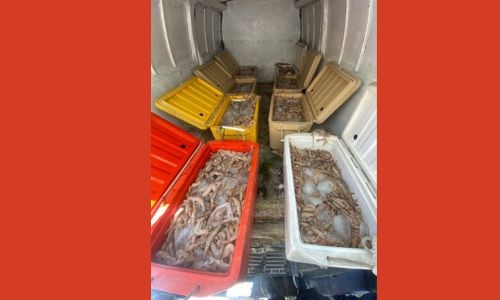The General Administration of Marine Wealth at the Supreme Council for the Environment recently seized approximately 410 kilograms of shrimp that were caught illegally, in violation of the shrimping ban. It is prohibited to catch, sell, display, or trade shrimp, especially using bottom trawl nets, during this ban period. This action goes against Ministerial Resolution No. 205 of 2018, which specifically bans fishing with bottom trawl nets. Judicial officers at the Fishing Ports Administration conducted regular and random inspections in the Capital Governorate, resulting in the confiscation of the large quantity of shrimp.
The Fishing Ports Administration has made it clear that they will continue to intensify inspections and implement strict procedures to discourage violators and uphold the ban on shrimping. Violators will be referred to the Public Prosecution for necessary legal actions. This crackdown on illegal shrimping activities is a necessary step to protect marine life and ensure the sustainability of aquatic resources in the region. By enforcing these regulations, authorities are sending a strong message that illegal fishing activities will not be tolerated and that stringent measures will be taken against those who disregard the laws.
It is crucial for the preservation of marine ecosystems that regulations on fishing practices are strictly adhered to. Illegal shrimp fishing, especially using bottom trawl nets, can have devastating impacts on marine life and disrupt the delicate balance of aquatic ecosystems. By banning such fishing methods and cracking down on violators, authorities are taking proactive steps to protect marine biodiversity and promote sustainable fishing practices in the region. This illegal activity not only harms the marine environment but also affects local fishermen who rely on these resources for their livelihoods.
The confiscation of a significant amount of illegally caught shrimp serves as a reminder of the importance of enforcing regulations on shrimping activities. The authorities’ actions to seize the shrimp and refer violators to the Public Prosecution highlight the seriousness of this issue and the need for strict enforcement of fishing bans. It is essential for all stakeholders, including fishermen, traders, and consumers, to adhere to these regulations to ensure the long-term sustainability of marine resources. By upholding these bans and cracking down on illegal fishing practices, authorities are taking a proactive stance on protecting marine life and preserving the ecological balance of the region’s waters.
The Supreme Council for the Environment’s efforts to combat illegal shrimping activities demonstrate a commitment to preserving marine ecosystems and promoting sustainable fishing practices. By seizing illegally caught shrimp and enforcing bans on bottom trawl nets, authorities are sending a clear message that violations of fishing regulations will not be tolerated. These actions also serve to protect the livelihoods of local fishermen who depend on marine resources for their income. Through continued monitoring and enforcement of fishing bans, authorities are working to safeguard the marine environment and ensure a sustainable future for aquatic resources in the region.
In conclusion, the recent seizure of illegally caught shrimp and the enforcement of bans on shrimping activities underscore the importance of upholding regulations to protect marine life and promote sustainable fishing practices. By cracking down on illegal fishing practices and referring violators to the Public Prosecution, authorities are sending a strong message that violations of fishing bans will face legal consequences. It is essential for all stakeholders to cooperate and comply with these regulations to ensure the long-term health and sustainability of marine ecosystems in the region. Through vigilant monitoring and enforcement, authorities are working towards preserving marine biodiversity and securing the future of aquatic resources for generations to come.











